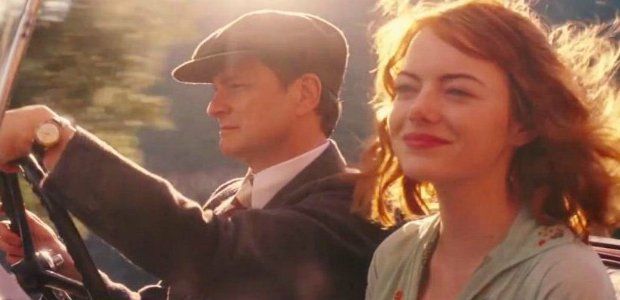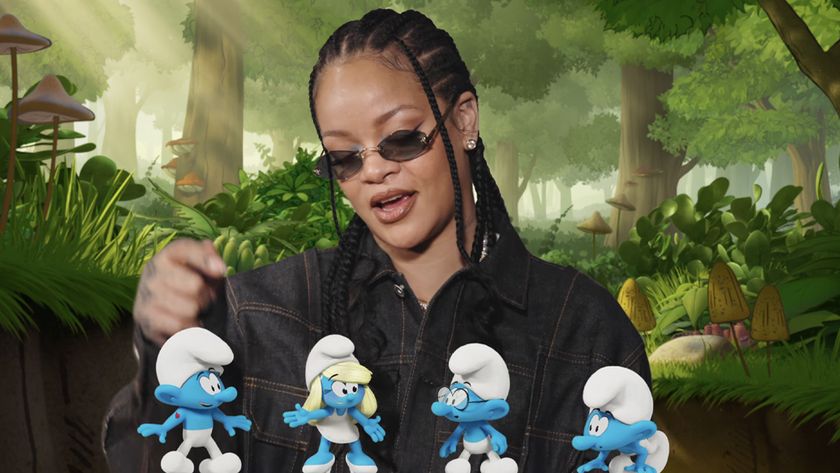Pride & Prejudice meets Harry Houdini's quest, meets Woody Allen's aesthetic. This is the recipe of Allen's latest Magic in the Moonlight. If you had given me this pitch a couple of weeks ago, I would have been totally delighted, expecting an intellectually stimulating and jaunty romance with a healthy edge of wit. Unfortunately, Allen doesn't get the magic of Mr. Darcy, overloading his prickly would-be lover with smugness and elitism to the point where this love story curdles.
Set in 1928, Magic In the Moonlight stars Colin Firth as Stanley, a world-renowned magician, and outspoken debunker of so-called spiritualists. He's Harry Houdini, except with a cringe-worthy use of yellow face he parades on stage as Wei Ling Soo, an "Oriental" practitioner of illusions complete with slanted eye makeup and appropriated accouterment. Thankfully, Stanley is quickly plucked from his Eastern costumes and offensive Berlin stage show and swept to Southern France where a colleague (Simon McBurney) invites him to debunk a beautiful American ingénue mystic named Sophie (Emma Stone). She is lovely, girlish, and easily charms the affluent English family who hosts her to have access to her gifts as a medium. But is she a fraud? While seeking to expose her, Stanley--despite his rationale and skepticism--begins to fall for this uneducated yet darling young woman.
Like past Allen offerings Midnight in Paris and The Purple Rose of Cairo, Magic in the Moonlight strives for an old school appeal. The sentimental cinematography is either crudely static or clunky enough in its motion to draw attention to itself, recalling movies like Alfred Hitchcock's France-set romance To Catch A Thief. The banter between characters is reminiscent of the kind of back and forth you'd see in Katharine Hepburn comedies, but not beloved ones like Bringing Up Baby or Philadelphia Story. There's too much dead air between Magic in the Moonlight's laughs to allow that comparison.
Part of the problem is that Magic in the Moonlight feels too much like something we've seen again, and again, and again. Admittedly, Firth isn't playing Allen's most typical anti-hero--essentially a neurotic New Yorker whose greatest enemy is himself. Instead, Firth plays his third incarnation of Mr. Darcy. However the magic is off this time around, and Firth--for all his charms--isn't charming. Stanley is instantly and thoroughly insulting to everyone he meets, which makes sense for a Darcy type. However, Stanley is a cold fish. Where Darcy of Pride & Prejudice and Mark Darcy of Bridget Jones's Diary each burned with a smoldering passion that intrigued and inspired lust, Stanley blathers on and on and on about death and atheism and his fears, none of which is particularly sexy. Sophie is, in every way, his opposite: for her firm belief in the wonders of the afterlife, her lack of education (an element that's repeatedly brought up), and her sweet disposition. It's easy to see why any and all would be beguiled by her. But why would she fall for a man this mean, snobby, racked with fear, and lacking in passion? Magic in the Moonlight never gives a believable reason. Instead, the narrative inevitably trudges along as another May-December fantasy of Allen's wherein a curmudgeonly old man finds new hope and joy in a romance with a younger woman who so desperately needs his guidance and love. Stone is darling as Sophie, and she radiates with joie de vivre. But Firth is such a wet blanket that the plotline that works so hard to throw them together becomes grating, killing all the whimsy of this could-be romp.
Another disappointment is Allen's shallow exploration of his central theme, weighing faith versus science. What could have been an engaging intellectual discussion from a smart writer devolves into repeated quoting of Friedrich Nietzsche and a thesis that people who believe in ghosts and gods may be happier in life, but they are basically stupid. Ultimately, we're meant to see Stanley's embracing of Sophie as a sign that love is like religious faith, in that it demands you let go of reason. But this feels too easy, and unchallenging. Frankly, I expected more from Allen.
All in all, Magic in the Moonlight is a muddled movie that delivers a gawky, unbelievable love story, tangled among a lazy intellectual debate, marinated in an abundance of sentiment and nostalgia. If you look at in the grander scale of Allen's works, there is some value in picking apart how it fits and what it might say about the filmmaker's state of mind as he ages closer to the realization of his own mortality. Along the way, there are some appealing performances from a supporting cast that includes Jackie Weaver, Eileen Atkins, Marcia Gay Harden, and Hamish Linklater. But as a piece of entertainment unto itself, Magic in the Moonlight is frustratingly flaccid and uninspiring.
Staff writer at CinemaBlend.
Most Popular








